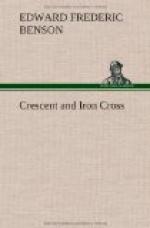may be thought to be some justification for measures
which might have been undertaken for the sake of public
safety. At any rate, there were definite charges
brought against Armenians in these districts, and
the Armenian boatmen of Silivri, for instance, were
imprisoned, but not, as far as I know, massacred, on
the charge of revictualling English submarines, which
at that time, as the reader will remember, had penetrated
into the Sea of Marmora, and indeed had reached Constantinople
itself. It is not, of course, consonant with Turkish
or Prussian justice to substantiate charges before
inflicting penalties, it is sufficient in the new
World-justice to accuse. But here round Constantinople,
there was some pretence at procedure before resorting
to murder and deportation. A register was drawn
up of all Armenians resident in the capital, dividing
into separate classes those who were born in Constantinople,
and those who were immigrants from Armenia, with a
view to deporting those who were not native to the
city. Here, I think, we may see traces of the
Prussian instinct for tabulation, for classification,
for category-mongering. Enver and his colleagues
lost patience with these dilatory tactics. The
Armenians of the province of Brussa were deported
wholesale, and long before the registration lists
of Constantinople were finished, all Armenians were
moved out of the town. Ten thousand males were
massacred in the mountains of Ismid, and the Armenian
women and children taken into collecting stations for
deportation to ‘agricultural colonies’
(so the phrase ran in the Pecksniff language of Prussia)
situated in the Anatolian desert, in the desert of
Arabia, and in malarious marshes on the Euphrates.
With this clearing out of Armenians from Thrace, from
Constantinople, and from Armenia itself, we have finished
with our first class of the Armenian atrocities.
For it reasons were at least invented by German apologists.
Military necessities, which here, as in Belgium, knew
no law, dictated it; the frightfulness involved was
incidental to War. But such considerations were
not even alleged for the second class of the murder-scheme.
Before passing on, it will be well to review, quite
shortly, the reasons which dictated it, and penetrate
into the infernal councils of Enver Pasha and Talaat
Bey.
The text of the scheme is to be found in the defined policy of the Young Turk party as set forth in their Congress of 1911. ’Turkey must become a really Mohammedan country, and Moslem ideas and Moslem influence must be preponderant.... Sooner or later the complete Ottomanisation of all Turkish subjects must be effected: it is clear, however, that this can never be attained by persuasion, but that we must resort to armed force.’




